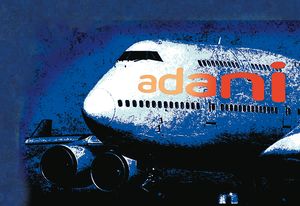The completion of the second round of privatisation of government-run airports sends out several signals.
For the corporate world, it signals the Adani Group’s entry into the aviation sector. It outbid existing private operators to bag six airports across India. For political parties in Kolkata and Chennai, it signals that the airports in India’s third and fourth largest cities, which are crown jewels of the government-run Airports Authority of India, could soon go to private hands. The AAI manages 125 airports, including 18 that have international operations. The government wants to gradually trim the number to less than 100.
Ever since the talk of privatisation of airports began during Madhavrao Scindia’s tenure as civil aviation minister in the Narasimha Rao government in the 1990s, Kolkata and Chennai have remained out of reach for private players. Even as airports in four other major metros—Delhi, Mumbai, Bengaluru and Hyderabad—and the emerging city of Kochi went to private operators of different hues and partnerships, the flag of resistance flew high in the metros of the east and the south.
The CPI(M), which ruled West Bengal for 33 years, and the Trinamool Congress, which has been ruling the state since 2011, have resisted the Centre’s attempts to allow private partnerships to run the Kolkata airport. The CPI(M) had a dominant outside influence on the United Front and the United Progressive Alliance governments, while Mamata Banerjee has been part of both the National Democratic Alliance government under A.B. Vajpayee and the second UPA government. Even though both the Trinamool and the CPI(M) have hostile ties with the Narendra Modi government, the Centre is pushing for the privatisation of the Kolkata airport in the third round.
In Tamil Nadu, the DMK under M. Karunanidhi had taken a policy stand against privatisation, be it in the case of the Neyveli coalfields or of the Chennai airport. Since the DMK was part of the governments headed by four prime ministers between 1996 and 2014, Karunanidhi’s wish had been the law.
J. Jayalalithaa, who succeeded him as chief minister, was friendly with Modi. She ensured that Chennai was kept out of the privatisation radar, and that government funds went into expanding the airport. Thus, when the government pushed hard for the second round of privatisation, the airports in Kolkata and Chennai were kept out of it. Instead, the list included smaller airports like Ahmedabad, Jaipur, Lucknow, Thiruvananthapuram, Guwahati and Mangaluru.
Even though the left front rules Kerala, the Centre pushed for the privatisation of Thiruvananthapuram, as the state had two airports that are not owned by the AAI. The Kochi and the recently inaugurated Kannur airport are run by private-public partnerships headed by Chief Minister Pinarayi Vijayan.
The Union government’s cabinet committee on economic affairs has taken a principled stand that all airports in state capitals and tier-II cities must be privatised. The prime minister’s office has told the civil aviation ministry to bite the bullet by including Kolkata and Jaipur airports in the third round.
But if the Lok Sabha elections cause a change of government in Delhi, giving a bigger say for regional parties in the Union government, then the plan to privatise Kolkata and Chennai airports could be shelved. At least until political “permission” comes from the local airport unions, which are affiliated to the regional parties.
sachi@theweek.in


